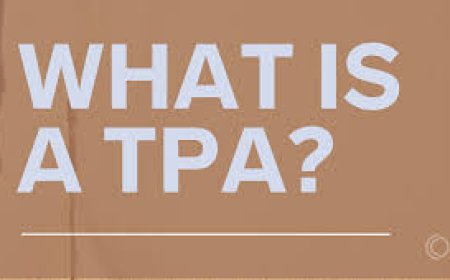Advancing Nursing Excellence Through Capella's FlexPath Model
Blog about Advancing Nursing Excellence Through Capella's FlexPath Model

In the dynamic landscape of modern healthcare, the demand for highly skilled, adaptable, and educated nurses has never been higher. Nurses are at the forefront of patient care, bridging clinical responsibilities, leadership duties, and ethical decision-making. To meet these evolving challenges, educational programs must offer more than traditional models. Capella Universitys FlexPath learning format is one such innovation thats redefining how nurses earn their degrees. For learners seeking guidance through this flexible format,flexpath assessments helpcan make a critical difference in achieving academic and professional success.
FlexPath is designed for todays busy professionals, offering an adaptable, self-paced route to mastering essential nursing competencies. Instead of following a strict academic calendar, students progress at their own speed, demonstrating knowledge through real-world assessments. This allows nurses to integrate learning seamlessly into their personal and professional lives, without compromising quality or relevance.
Why FlexPath Appeals to the Modern Nurse
FlexPath offers a competency-based education model tailored to meet learners where they are. This system doesn't rely on memorization or timed exams. Instead, it focuses on real-world scenarios, practical applications, and measurable outcomes. For working nurses, this is a game changer.
The ability to move through coursework at a personalized pace empowers students to focus on mastery rather than speed. Those with prior knowledge or clinical experience can accelerate through familiar material, while others may choose to spend more time on complex topics. This tailored approach ensures deeper understanding and retention of critical nursing concepts.
Moreover, FlexPath supports nurses with diverse responsibilities. Whether theyre parents, caregivers, or working full-time, learners can balance education without the stress of rigid deadlines or inflexible class schedules.
Core Pillars of FlexPath Nursing Education
Capellas FlexPath curriculum is aligned with key nursing competencies demanded by employers and accrediting bodies. These include:
1. Clinical Judgement
FlexPath assessments challenge students to evaluate patient scenarios, prioritize care, and apply nursing theories to practice. These tasks mimic real-life responsibilities and foster critical thinking.
2. Leadership and Management
Assignments often involve developing action plans for quality improvement, staff training, or organizational change. These activities nurture leadership potential and strategic decision-making.
3. Evidence-Based Practice
Students learn to find, analyze, and implement the best available evidence to guide care. This builds skills in research interpretation, outcome evaluation, and continuous improvement.
4. Cultural Competence
Through assessments that address health disparities and diverse populations, students build sensitivity to patients cultural and social contextsskills that are vital in todays healthcare landscape.
Practical Learning Through Authentic Assessments
One of the standout features of FlexPath is the design of its assessments. Instead of taking standardized tests, students complete projects that replicate real-world nursing scenarios. These may include:
-
Developing patient care plans
-
Analyzing case studies
-
Designing quality improvement strategies
-
Drafting proposals for leadership initiatives
A key example isnurs fpx 4000 assessment 3, which focuses on a current quality or safety issue in a healthcare setting. In this assessment, students:
-
Identify a clinical or systemic problem (e.g., fall risk, medication errors)
-
Research and analyze the contributing factors
-
Propose a data-supported solution
-
Create an implementation and evaluation strategy
This type of assessment helps students not only understand nursing concepts, but apply them in a professional, real-world context. It reinforces confidence and prepares graduates to lead positive change in their workplaces.
Flexible, Self-Paced, and Student-Centered
One of the most appealing aspects of FlexPath is that it removes the one-size-fits-all model of learning. Courses do not follow weekly modules or require synchronized participation. Instead, students are given broad timeframes to complete each assessment and can submit when ready.
This model works especially well for adult learners who bring prior experience and knowledge to the table. A nurse who already understands patient education strategies, for example, can complete that assessment quickly and move on. On the other hand, if a student is unfamiliar with health informatics, they can take more time to explore that area without penalty.
Capella also offers strong faculty support, providing detailed feedback, clarity on expectations, and guidance for improvement. Each learner also works with a coach to stay on track and navigate challenges. This combination of independence and support fosters academic success and personal growth.
Fostering Professional and Ethical Growth
FlexPath does more than impart knowledgeit shapes the professional identity of future nurse leaders. The curriculum integrates ethical scenarios that encourage reflection, self-awareness, and value-driven decision-making.
Students explore real dilemmas such as:
-
Confidentiality breaches in digital health records
-
Ethical issues in end-of-life care
-
Balancing cost efficiency with patient-centered care
Assignments invite learners to analyze these cases using ethical frameworks, helping them clarify their professional responsibilities and moral boundaries.
This approach ensures that graduates are not only clinically competent but also emotionally and ethically equipped to serve patients with integrity and compassion.
Supporting Lifelong Learning and Career Advancement
FlexPath promotes habits that support lifelong learninga necessity in nursing, where standards, tools, and evidence are constantly evolving. Students develop research habits, reflection skills, and self-assessment strategies that they can use throughout their careers.
Moreover, FlexPath is often just the beginning. Many graduates go on to pursue advanced practice roles, certifications, or graduate-level degrees. The flexible structure prepares them for further education by emphasizing independence, discipline, and clarity in communication.
Employers also recognize the value of a FlexPath education. Because the model mimics workplace challenges, students graduate prepared to contribute meaningfully on day one. They understand system-based practice, performance measurement, and how to lead collaborative efforts.
Building Confidence and Capability
FlexPath not only develops academic skills but also boosts student confidence. By progressing through assessments and receiving constructive feedback, students begin to recognize their growth. Each completed project becomes a milestone in their journey from learner to leader.
They learn to:
-
Research and apply evidence
-
Communicate professionally in written form
-
Present data-driven arguments
-
Reflect on personal strengths and areas for growth
These skills are universally applicable across clinical, administrative, and policy-related roles in nursing.
Integrating Technology in Nursing Education
Technology is now embedded in every aspect of healthcarefrom electronic health records to telehealth systems. FlexPath incorporates these realities into its coursework, helping students become proficient with:
-
Data documentation and analysis
-
Clinical decision support systems
-
Patient portals and digital communication
-
Evaluating digital tools for patient safety and effectiveness
Assignments often require the use of simulated technologies or evaluations of digital resources, allowing students to think critically about how technology shapes care delivery. These competencies are invaluable as healthcare continues to digitize and nurses take on increasingly technical responsibilities.
Conclusion
In an age when the nursing profession is expected to solve some of the healthcare systems greatest challenges, the education of nurses must rise to meet those expectations. Capella Universitys FlexPath format provides a forward-thinking, student-centered model that supports nurses in developing clinical expertise, leadership ability, and ethical awareness.
Through scenario-based assessments, flexible pacing, and an emphasis on real-world application, FlexPath empowers students to own their learning and shape their future. It enables adult learners to advance their education without stepping away from the responsibilities they already hold.
The capstone assessment,nurs fpx 4015 assessment 4, exemplifies how FlexPath students synthesize their learning to propose impactful, evidence-based solutions to pressing healthcare issues. By the time they complete the program, graduates are not only ready to step into complex rolesthey are prepared to lead.
FlexPath is more than a formatits a transformative experience that turns nurses into scholars, leaders, and advocates for better care.



































